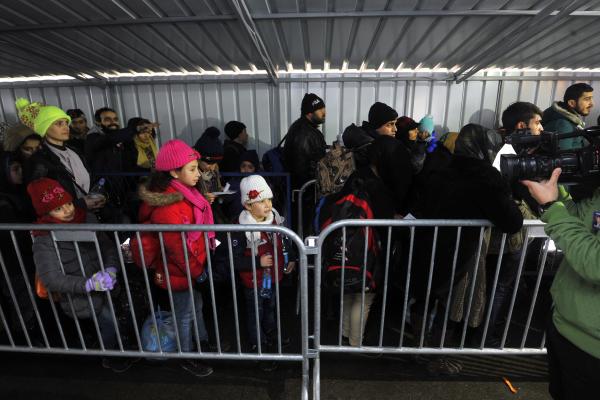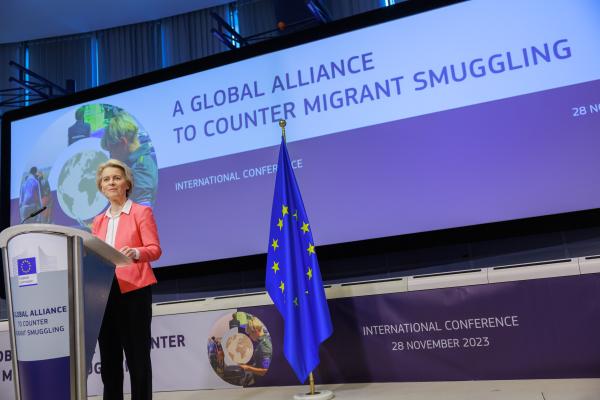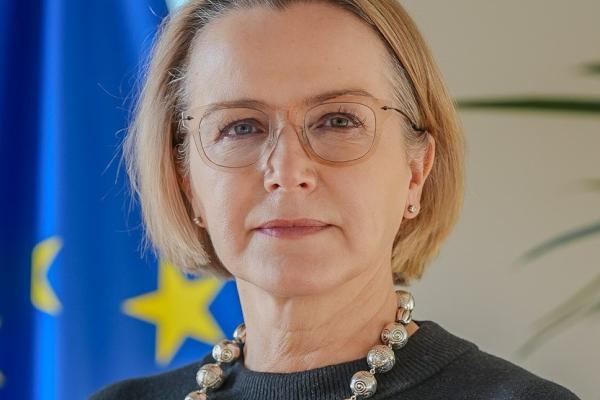What is the Commission’s role in countering irregular migration and migrant smuggling?
The European Commission plays a key role in countering the irregular immigration of non-EU nationals into and within the EU. As part of its efforts to strengthen the EU's migration policy, the Commission works closely with EU countries and agencies, international partners, and other stakeholders to prevent irregular migration, protect migrants' rights, and ensure the dignified return of those who are not eligible to stay in the EU. The Commission’s 2023 Communication establishing the multiannual strategic policy for European integrated border management lays down priorities and guidelines to maintain a high level of security and ensure the effective management of the EU’s external borders, including with the use of information technology.
Migrant smuggling, a highly adaptive global criminal activity, is rapidly evolving into a key factor of irregular migration. Driven by poverty, social and political instability, as well as the limited availability of legal migration routes, migrant smuggling pushes people towards criminal networks to facilitate their unauthorised entry, transit or stay in the EU. The journey to the EU can be extremely dangerous and smugglers frequently expose migrants to life-threatening risks and violence. Smuggling of migrants by sea is one of the most dangerous forms of migrant smuggling. The loss of lives in the Mediterranean Sea and the Atlantic Ocean demonstrates the need for an assertive and urgent response from the EU. In order to strengthen international cooperation against migrant smuggling between countries of origin, transit and destination and with all relevant stakeholders, including international organisations, the Global Alliance to Counter Migrant Smuggling was launched, in November 2023.
The Commission's work focuses on:
- Developing, proposing and implementing directives, regulations and recommendations to effectively counter irregular migration and migrant smuggling;
- Securing the Union’s external borders, by enhancing border management and surveillance to prevent irregular migration;
- Developing integrated information exchange systems (such as the Visa Information System) and biometric databases (such as Eurodac) for proper identification and registration of non-EU nationals;
- Providing technical assistance, capacity-building support, and financial resources to EU countries to better manage migration;
- Cooperation with Frontex, to coordinate border control operations, monitor irregular border crossings into the EU, and provide intelligence, data, and risk analyses reports to EU and Member States authorities.
- Promoting safe and orderly migration pathways, including through the development of legal migration channels;
- Improving cooperation with non-EU countries to address the root causes of migration and facilitate returns.
What is the European Union’s policy on returns?
Return and readmission are essential elements of a comprehensive approach to migration management and of a credible migration policy. The EU’s policy aims to ensure the effective, humane and dignified return of those without a right to stay in the EU, for example persons who have had their asylum application rejected or those who have overstayed their visas. The policy ambition is to combine stronger structures inside the EU with more effective cooperation with third countries on return, readmission and reintegration. The Commission’s work focuses on enhancing the effectiveness of returns through legislation, practical and operational tools as well as engagement with third countries on readmission cooperation.
The Commission works with Member States and Frontex to put in place a common EU system for returns. The focus primarily lies on establishing comprehensive and coherent return and reintegration systems with efficient procedure, including return counselling structures, in which different migration authorities seamlessly cooperate. In line with the EU Strategy on voluntary return and reintegration, the Commission, Frontex and the Member States have enhanced their operational capacity for incentivising voluntary return and enabling sustainable reintegration.
On the external dimension, the Commission is engaging with third countries on improving cooperation on readmission, including in the context of comprehensive partnerships and using all relevant tools and policies. The Commission regularly monitors cooperation in the framework of the existing bilateral and multilateral readmission instruments and through the annual assessment on readmission cooperation under Article 25a of the Visa Code.
In March 2025, the Commission put forward a new legislative proposal aiming to put in place swifter, simpler and more effective return procedures across the EU. The new rules will give Member States the necessary tools to make return more efficient while fully respecting fundamental rights.
The proposal includes:
- Common procedures for the issuance of return decisions and a European Return Order;
- mutual recognition of return decisions;
- clear rules on forced return, while incentivising voluntary return;
- obligations for returnees to cooperate and consequences for non-cooperation;
- strong safeguards throughout the entire return process;
- stricter rules to limit abuse and manage absconding;
- specific rules for people posing a security risk;
- readmission as part of the return process;
- the possibility for Member States to return individuals who are illegally staying in the EU and have received a return decision, to a third country, based on an agreement or arrangement.
Next steps:
The proposed rules are a key piece to complement the Pact on Migration and Asylum adopted last year. It is now for the European Parliament and the Council to agree on the proposal.

Learn about EU’s strategy to combat migrant smuggling, contributing to saving the lives of migrants at sea.

An effective and humane return policy is an integral part of a comprehensive migration and asylum policy.

The International Conference on a Global Alliance to Counter Migrant Smuggling is taking place on Tuesday 28 November 2023, in Brussels.

The EU Return Coordinator's main task is to bring together different strands of EU return policy, supporting its consistent and coherent implementation, and to establish a common EU system for returns.
